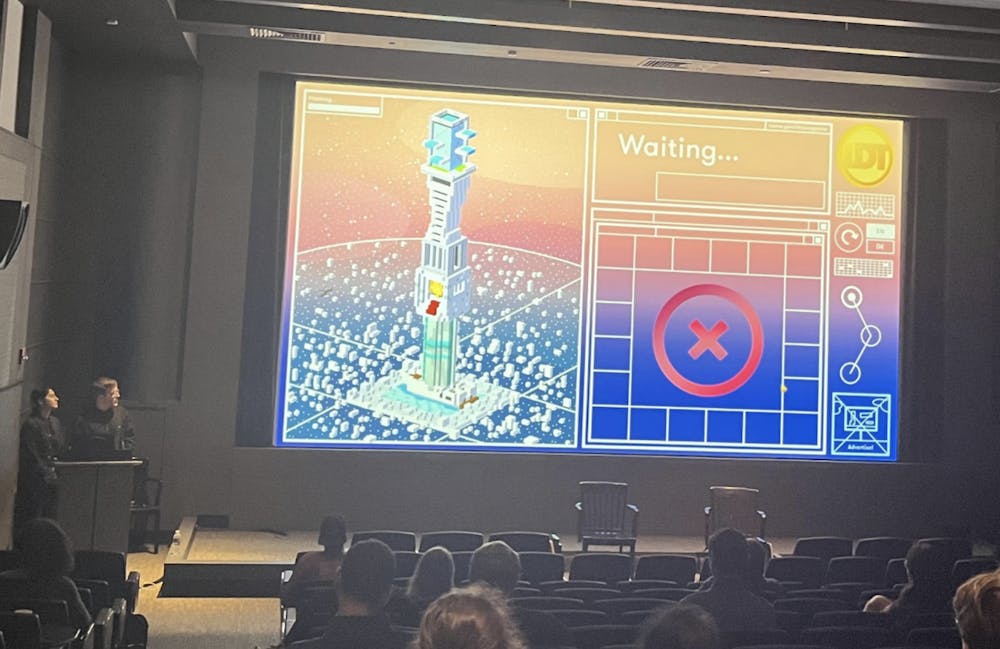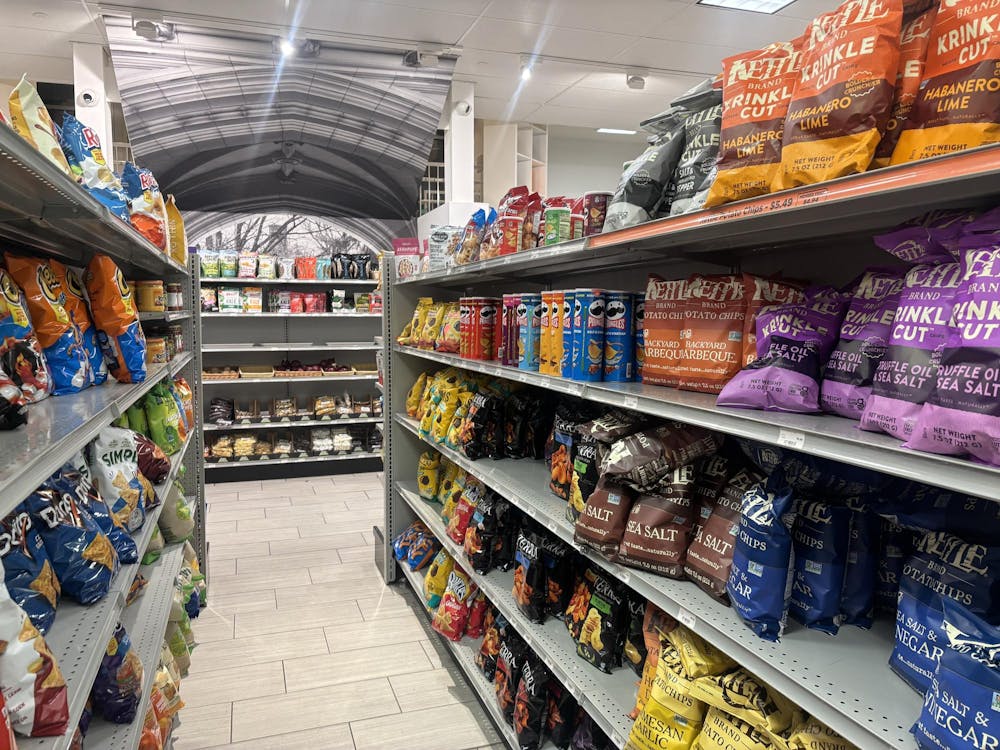On Saturday, Nov. 12, five guest speakers spoke on campus about game design and development at Games &&, a symposium organized by Tim Szetela, a lecturer in visual arts.
The symposium was co-sponsored by Princeton University’s Lewis Center for the Arts and the Council on Science and Technology and supported through the John Sacret Young ’69 Lecture Series fund.
Nicole He, a game developer and creative technologist working with the National Film Board of Canada, delivered a lecture titled “Making Weird Art In Creative Technology vs. Video Games.”
“My job at Kickstarter was meeting a lot of creative people who were doing really creative and interesting things,” she said of one of her first jobs in the industry. “I was like, I guess my job is helping those people, but what if I could be those people?”
She showed attendees a short video of a project called the “True Love Tinder Robot” and said that the video had a significant impact on her career, earning her invites to festivals and conferences, and later a job at Google Creative Lab.
“There’s something about games that just move people deeply. It has this power. People are willing to suspend disbelief and engage with something for a long period of time in a way that they aren’t for almost any other media, and they’re willing to pay for it,” she added.
The next lecture, titled “Media and Methods for Video Game Urbanism,” was delivered by Luke Caspar Pearson and Sandra Youkhana, collectively known as You+Pea. They are the co-founders of the Videogame Urbanism studio at the Bartlett School of Architecture, University College London.
Pearson and Youkhana’s focus on architecture in video games is driven by a desire to break down barriers, they said at the event.

“Architecture is a discipline which is legally protected in many countries,” Pearson said. “The agency of virtual worlds, I think, is a way we feel like we can break down some of these kinds of professional boundaries and we can take advantage of the fact that architects use these technologies a lot in their work anyway.”

Luke Caspar Pearson and Sandra Youkhana speaking about London Developers Toolkit ‘2.0’.
Jackie Zhou / The Daily Princetonian
Pearson and Youkhana presented their game titled “London Developers Toolkit ‘2.0,’” a game described on their website as a “‘satirical app’ / renegade startup platform investigating the burgeoning skyline of phallic residential developments across London.”
“[The game is] speaking about a very serious issue that London’s facing as a city,” said Pearson. “There are hundreds of these new buildings. The architectural oversight seems to be quite limited, and they’re not really for people that live in London. They’re attracting outside investment and a lot of these things aren’t actually ever occupied.”

After a break for lunch in the Matthews Acting Studio, Robert Vinluan, lead product designer of games at The New York Times, spoke about how the beginning of his career was unconventional.
“I wanted to talk about sort of the process of making games at a place like The New York Times, which is not a place that people think of that makes games,” he said.
“I'll take you back to when I first started working on the games team,” he said. “Back then... it was just a crossword and the crossword was an app and a product that was newly digital.”
According to Vinluan, the Times’ “first big hit” in the games department was Spelling Bee.

Robert Vinluan speaking at Games && Symposium.
Jackie Zhou / The Daily Princetonian
Next, Salome Asega, director of NEW INC at the New Museum gave a lecture titled “Collective Futures.”
Asega discussed her projects at the Iyapo Repository.
“This repository is named after Lilith Iyapo, who is a kind of central figure in Octavia Butler’s [science fiction series] ‘Xenogenesis,’” she said. “Through what we called the August Wilson Center lab, we tweaked our workshop curriculum and added three new tracks that made time for exposure and hands-on exploration of the tools that we’re using in our studio.” Asega focused on one track in particular — digital fabrication.

Monster truck that looks like a rat made by Salome Asega.
Photo courtesy of Salome Asega
The last speaker was Mattie Brice, a visiting assistant professor at the NYU Game Center who gave a lecture entitled “Video Games Did Not Save Us: A Need For New Design(s),” focusing on her vision as a video game developer.
“When we kind of think of games, we think of empowerment, we think of choice, we think of free will, exploration, and agency,” she said. “But I feel like there was something a little bit amiss about how those ideas and tenants and qualities were being applied to change work.”
Brice expanded on the importance of rethinking design goals in video games.
“A common critique of [social impact games] is that [they] are not fun enough for people to learn from and build,” she said. “However, fun really flattens a lot of nuance and a lot of actions that you can do in this space if everything must be fun.”
Nemo Newman ’23, a member of the audience, told The Daily Princetonian, “Seeing how interactive arts can be applied and how people are thinking about it is really interesting, particularly as an artistic practice rather than as an economic endeavor for commercial games.”
Szetela, the organizer, told the ‘Prince’ that, “I think there’s something particularly special about games in their potential to be creative and creative expressive tools kind of similar to animation in a way.”
In regards to the choice of speakers, Szetela said, “my goal was to bring a wide variety of perspectives and practices and technology and type of art and type of design.”
“I think our idea of games is expanding,” he said. “There’s a lot of potential connection points into other fields, and I think that’s another area that Princeton in particular could be poised to make some interesting collaborations, thinking about how games could connect to other fields of study.”
The symposium was held on the first floor at 185 Nassau Street from 10 a.m to 5:30 p.m on Saturday, Nov. 12.
Jackie Zhou is a news contributor for the ‘Prince.’ Please send all corrections to corrections at dailyprincetonian.com.








